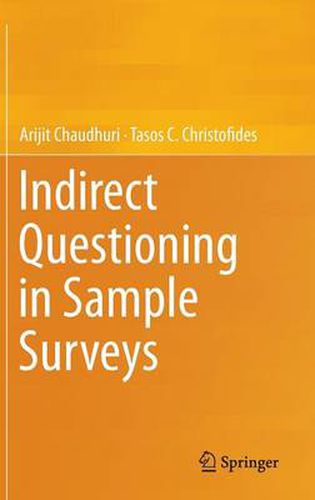Readings Newsletter
Become a Readings Member to make your shopping experience even easier.
Sign in or sign up for free!
You’re not far away from qualifying for FREE standard shipping within Australia
You’ve qualified for FREE standard shipping within Australia
The cart is loading…






This title is printed to order. This book may have been self-published. If so, we cannot guarantee the quality of the content. In the main most books will have gone through the editing process however some may not. We therefore suggest that you be aware of this before ordering this book. If in doubt check either the author or publisher’s details as we are unable to accept any returns unless they are faulty. Please contact us if you have any questions.
Indirect questioning is a crucial topic in surveys of human populations. When the issue is about a stigmatizing characteristic (for example about illegal drug use), standard survey methodologies are destined to fail because, as expected, people are not willing to reveal incriminating information or information violating their privacy. Indirect questioning techniques have been devised so that the privacy of participants in a sample survey is protected and at the same time good estimates of certain parameters (e.g. the percentage of people in a certain community who use illegal drugs) can be delivered. The topic is modern and still under development.
Indirect Questioning in Sample Surveys represents a collection of the most important and recent techniques of indirect questioning, including various versions of randomized response, the item count technique, the nominative technique, the three-card method, non-randomized response models and negative surveys, while also exploring the key aspect of protecting privacy.
$9.00 standard shipping within Australia
FREE standard shipping within Australia for orders over $100.00
Express & International shipping calculated at checkout
This title is printed to order. This book may have been self-published. If so, we cannot guarantee the quality of the content. In the main most books will have gone through the editing process however some may not. We therefore suggest that you be aware of this before ordering this book. If in doubt check either the author or publisher’s details as we are unable to accept any returns unless they are faulty. Please contact us if you have any questions.
Indirect questioning is a crucial topic in surveys of human populations. When the issue is about a stigmatizing characteristic (for example about illegal drug use), standard survey methodologies are destined to fail because, as expected, people are not willing to reveal incriminating information or information violating their privacy. Indirect questioning techniques have been devised so that the privacy of participants in a sample survey is protected and at the same time good estimates of certain parameters (e.g. the percentage of people in a certain community who use illegal drugs) can be delivered. The topic is modern and still under development.
Indirect Questioning in Sample Surveys represents a collection of the most important and recent techniques of indirect questioning, including various versions of randomized response, the item count technique, the nominative technique, the three-card method, non-randomized response models and negative surveys, while also exploring the key aspect of protecting privacy.